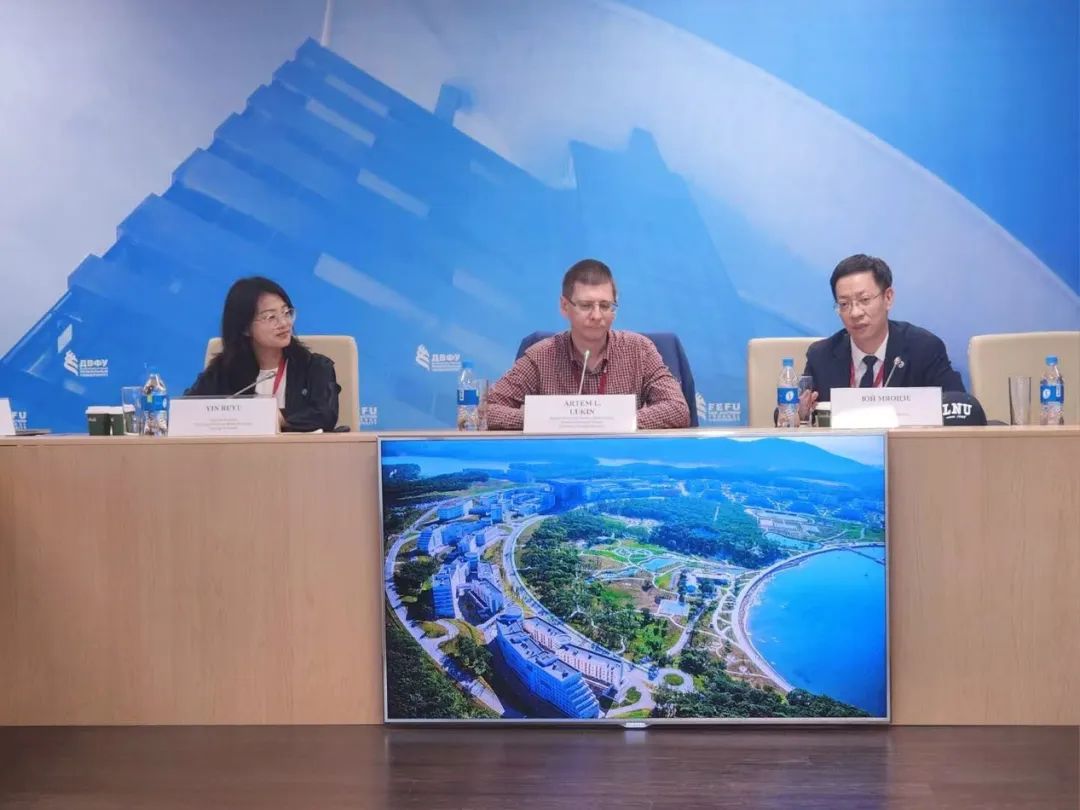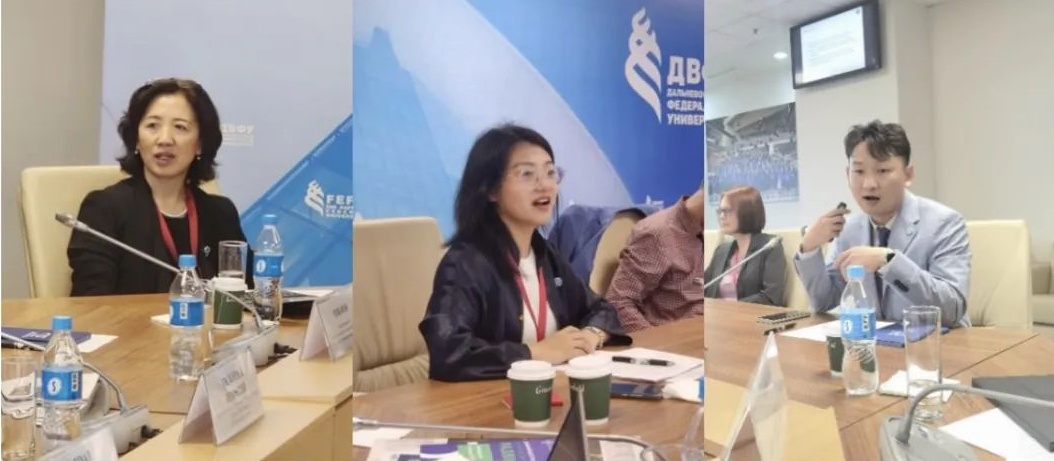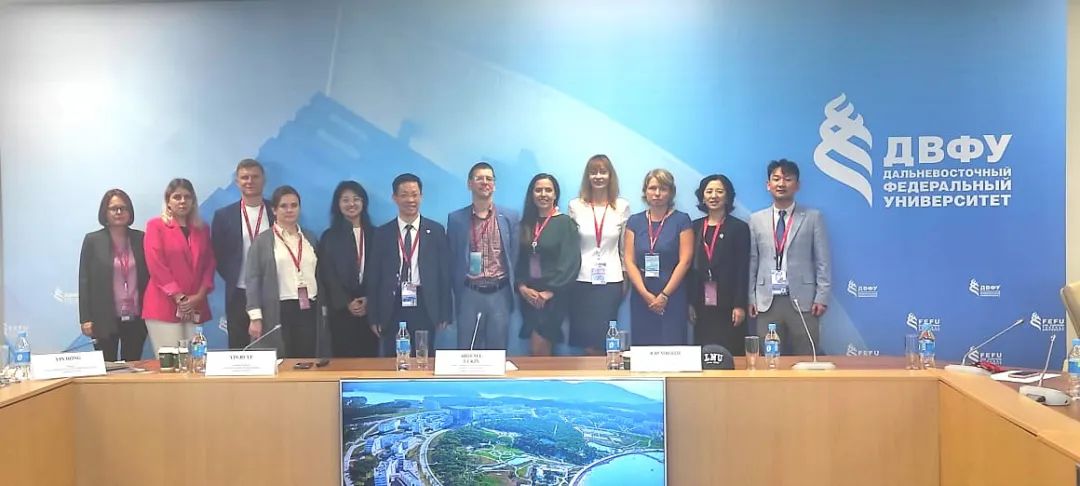From September 3 to 6, 2024, the 9th Eastern Economic Forum was held in Vladivostok, Russia. The forum, themed ‘Far East 2030: Combining Strengths to Create New Potential’, brought together over 6,000 officials, entrepreneurs, scholars, and experts from 76 countries and regions. The agenda included discussions on international cooperation in a changing world, issues related to the global economy and financial situation, and the development of Russia’s Far East and its role in the region.
Professor Yu Miaojie, a Deputy to the 14th National People’s Congress, fellow of the International Economics Association, Deputy Secretary of the CPC Committee and President of Liaoning University was invited to attend the 9th Eastern Economic Forum and visited Russian Far Eastern Federal University during the time. Associate Professor Yin Ruyu, Deputy Director of the Office of International Affairs, Professor Yin Hong from School of International Economics and International Relations and Assistant Professor Chen Feng from Li Anmin Institute of Economic Research also joined the visit and conducted academic exchanges.
On September 5, the delegation led by Yu Miaojie attended the round-table forum on ‘Far East Development and China-Russian Cooperation’ in Vladivostok. As part of the Eastern Economic Forum, the forum was co-hosted by Liaoning University and Russian Far Eastern Federal University and jointly undertaken by the China-Russian Institute of Far East Cooperation and Development of Liaoning University and the Oriental College of Far Eastern Federal University. The academic seminar was joined by nine experts and scholars from the Oriental College, the School of Economics and Management and the College of Arts and Humanities from Far Eastern Federal University and Professor Yu Miaojie, Associate Professor Yin Ruyu, Professor Yin Hong and Assistant Professor Chen Feng from Liaoning University. The seminar was co-chaired by Associate Professor Yin Ruyu, Executive Dean of the China-Russian Institute of Far East Cooperation and Development of Liaoning University and Associate Professor Artyom Lukin, Vice President of the Oriental College of Far Eastern Federal University.

First, nine experts and scholars from Far Eastern Federal University delivered keynote speeches on such topics as the economic development, the social and demographic situation, the development of energy and power systems in the Far East, the passage between the Far East and China and transportation infrastructure. Yelena Oliynyk, a professor from the School of Economics and Management of Far Eastern Federal University analyzed the economic development and main problems in the Far East. She also stressed the necessity and importance of long-term China-Russian economic cooperation from the historical and practical perspectives. Victoria Jeni, an Associate Professor from the Oriental College of the Far Eastern Federal University analyzed the status of the energy and power sectors in the Far East under western sanctions, believing that the Far East is an important base for Russia’s energy production and export. He added that the region has the potential to expand oil and gas production capacity, but there are infrastructure constraints, especially in remote areas. He also believed that the strategic goals of the oil and gas sectors in the Far East should not be limited to expanding exports, but also ensure the integration of energy and electricity between eastern Russia and its European region. Besides, under western sanctions, it is important to integrate the energy and power systems of Siberia and the Far East to form a price competitive advantage and develop nuclear energy. Finally, he stressed that in the current period of geopolitical tension, it is particularly important to carry out the digital transformation of electric energy system. Ph.D. Tarantul Victorovich from the Department of International Relations of the Oriental College of Far Eastern Federal University believed that the number of cargo crossing ports between Russia and China is only half of that of Russia and Kazakhstan, which urgently needs to be developed. He added that the Far East represents an important position in China-Russian trade and the improvement of its goods passage and transportation infrastructure is also very important for the flow of goods and people. Other scholars from Far Eastern Federal University also gave speeches on the topics of Far East development and China-Russian cooperation.
Starting from the economic and trade cooperation between Liaoning Province and Russia, Professor Yin Hong noted that the provincial government attaches great importance to this region despite the fact that Liaoning Province does not enjoy the geographical advantage of Russian Far East and has faced challenges in cooperating with Russia in the past two decades. She compared the import and export data in 2023, stating that the export potential of Liaoning Province to Russia needs to be fully tapped. Finally, she stressed that the present is a critical period of China-Russian economic cooperation and more attention should be paid to the quality of cooperation to promote long-term stability and sustainable development in the future. She suggested that efforts should be made on improving the regularity of the cooperation system to inject new vitality into bilateral relations.
Associate Professor Yin Ruyu, Executive Dean of the China-Russian Institute of Far East Cooperation and Development of Liaoning University delivered a speech titled ‘Russian Capacity and Resilience in Wartime’. By analyzing Russia’s national capacity growth from 2014 to 2022, she stressed its strategic depth and flexibility in military conflicts. She noted that Russia’s wartime resilience is reflected in three stages: short-term defensive resilience, medium-term adaptive resilience and long-term recovery resilience. She mentioned that Russia has demonstrated its ability to adapt and recover from global uncertainty through flexible resources allocation and policy adjustment, greatly underpinning the country’s long-term stability.
Chen Feng analyzed how cultural differences play an important role in communication, building trust and business decision-making and the negative impact on bilateral trade by using a trade gravity model and the theory of cultural distance. He put forward four policy suggestions on promoting China-Russian cultural exchanges and the development of the Far East: first, promote exchanges and cooperation between China and Russia in the field of education and cultivate talents with a global vision; second, deepen the cultural understanding between the two sides through cultural activities;nthird, promote language learning to reduce misunderstandings in cross-cultural communication; fourth, boost cooperation in the media and the arts to show multicultural perspectives.

At the end of the seminar, President Yu Miaojie gave a summary and answered questions raised by Associate Professor Lukin. Firstly, regarding whether China’s low-carbon policy will affect its imports from Russia, he believed that although China is undergoing a low-carbon transformation, China-Russian cooperation in the service industry and agriculture would continue to boost and the future trade cooperation between the two sides would not be significantly affected. Secondly, on the question of whether China’s tariff reduction will have an impact on Russian manufacturing, he noted that the market opening can be promoted in an orderly manner through a Preferential Trade Agreement to effectively avoid impacts on Russian manufacturing and ensure the balance and sustainability of economic cooperation between the two sides.

The seminar was held under the framework of the Eastern Economic Forum, further deepening the exchanges between Liaoning University and Russian Far Eastern Federal University in the fields of higher education and scientific research. During the time, the two sides signed an agreement on a joint master’s training program and made new progress in scientific research, academic and cultural exchanges, laying a solid foundation for the future cooperation between the two universities.